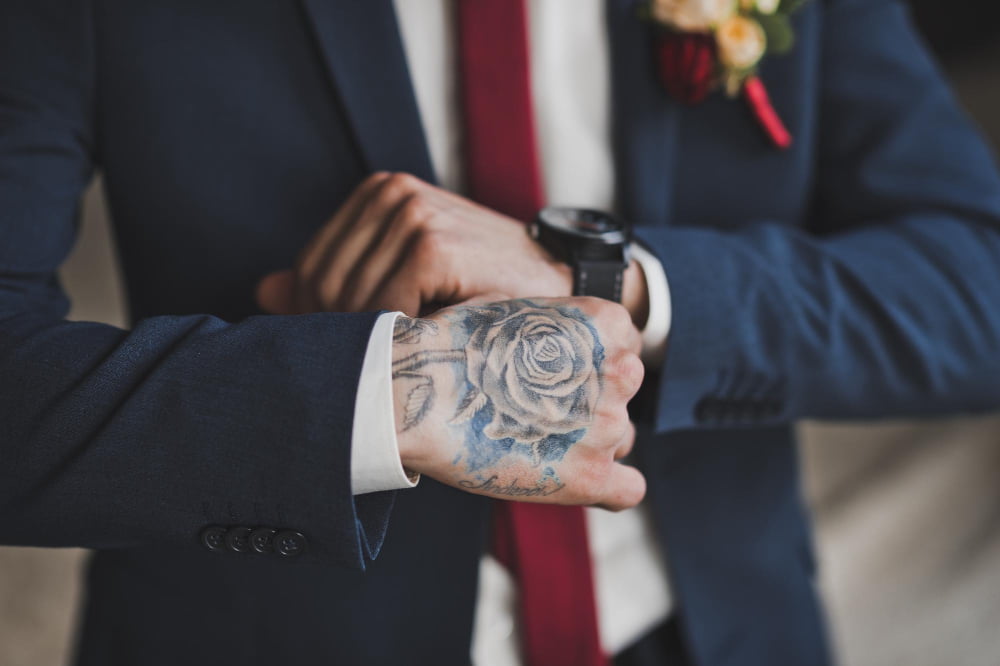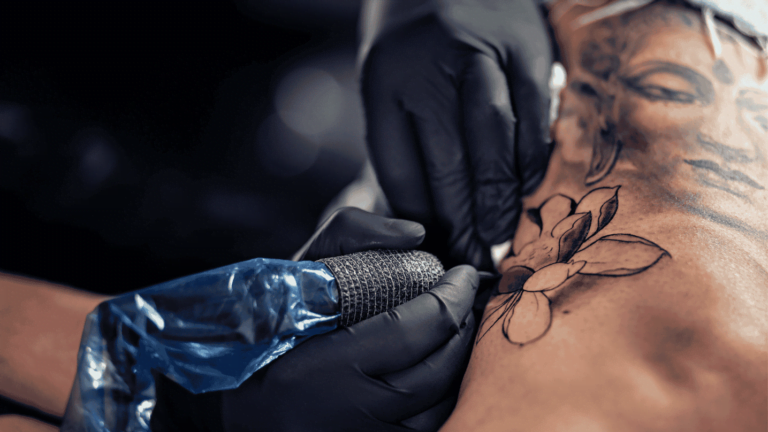As the legal profession continues to evolve, the question of whether lawyers can have tattoos has become a topic of considerable interest. While tattoos are increasingly accepted in many industries, the legal industry still adheres to certain professional appearance standards that may conflict with visible body art. In this article, we will delve into the intersection of tattoos and legal careers, exploring the challenges and considerations that lawyers with inked skin may face.
Key Takeaways:
- The legal industry has strict dress codes and appearance guidelines that may limit the acceptance of visible tattoos.
- Research shows that individuals with tattoos are not less likely to be employed or earn less than their non-tattooed counterparts.
- Biases and stereotypes towards tattooed individuals, particularly women, can influence perceptions of professionalism in the legal profession.
- Creating a culture of diversity and inclusion in law firms can lead to better business outcomes and a more engaged workforce.
- The decision to have tattoos as a lawyer ultimately rests with the individual, who must weigh the potential challenges and opportunities it may bring to their legal career.
Tattoo Policies in the Legal Industry
In the legal profession, the acceptance of tattoos varies and there is no universal policy regarding body art. Different law firms have different appearance guidelines and tattoo acceptance policies. While some firms may require employees to cover up their tattoos, others may have more relaxed policies that allow visible tattoos. It is crucial for individuals considering a career in law to research the specific tattoo policies of the firms they are interested in working for to ensure a good fit.
Attorney tattoo policies can significantly impact a lawyer’s professional appearance, as they may have to make decisions about where and when to reveal their tattoos. While attitudes towards tattoos in the legal profession are slowly changing, visible tattoos are still stigmatized in many law firms where a conservative image is desired. This stigmatization can affect a lawyer’s perception of professionalism and potentially limit career opportunities.
Law firm appearance guidelines can play a role in promoting a certain image and maintaining client confidence. Some law firms may believe that visible tattoos are not consistent with their desired professional image, while others may be more open to diversity in appearance. It is important for lawyers to align themselves with firms that have tattoo policies that align with their personal values and self-expression.
Listed below are some examples of different tattoo acceptance policies that lawyers might encounter in the legal profession:
| Law Firm | Tattoo Policy |
|---|---|
| XYZ Law Firm | Tattoos must be covered at all times when in the office or meeting clients. |
| ABC Law Firm | Visible tattoos are allowed, but offensive or inappropriate tattoos must be covered. |
| 123 Law Firm | Tattoos are embraced as a form of self-expression; no need to cover them. |
| Law & Associates | Visible tattoos are allowed, but discretion is advised, especially in client-facing situations. |
It is evident that different law firms have diverse perspectives on tattoos. Some firms prioritize a conservative image, which may require employees to cover up their tattoos, while others embrace tattoos as a personal choice that does not impact a lawyer’s professionalism. Understanding these policies and cultural dynamics is crucial for individuals entering the legal profession and seeking a supportive work environment.
While the policies surrounding tattoos in the legal industry are evolving, it is important for both employers and employees to have open discussions about appearance guidelines and expectations. By fostering a culture of open communication and understanding, law firms can create inclusive environments that value diversity, while still maintaining professionalism.
In the following section, we will delve into the perceptions and biases towards tattoos in the legal profession and their impact on the professional reputation of tattooed lawyers.
Perceptions and Biases Towards Tattoos in the Legal Profession
Studies have shown that tattoos can be subject to negative perceptions and biases within the legal profession, particularly for tattooed individuals, including lawyers and other legal professionals. These biases can impact the perception of professionalism and credibility in the workplace.
Research has found that tattooed women, in particular, may face harsh judgment and stereotyping in professional settings. They can be unfairly labeled as more promiscuous, heavy drinkers, and less caring, intelligent, and honest. These negative perceptions can create obstacles and barriers for tattooed lawyers who wish to express themselves through body art.
Despite the personal nature of tattoos as a form of self-expression, some individuals within the legal industry may hold biases and make judgments solely based on appearance. These biases can lead to unfair treatment, limited career opportunities, and difficulties in building professional relationships.
It is important to recognize that professionalism goes beyond external appearance and should be based on the skills, expertise, and integrity of an individual. Yet, the presence of tattoos can still create unjust preconceptions that can hinder the professional growth and opportunities of tattooed lawyers.
Breaking Stereotypes and Expanding Perspectives
To address these biases and promote inclusivity in the legal profession, it is essential to challenge stereotypes and expand perspectives. Embracing diversity, including tattooed professionals, can contribute to a more inclusive and representative legal industry.
Law firms and legal organizations can take steps towards fostering a workplace culture that values individuality and cultivates an environment of respect and acceptance. This can be achieved through revisiting dress code policies, creating diversity and inclusion initiatives, and actively challenging discriminatory attitudes.
By embracing and celebrating the unique identities of tattooed lawyers, law firms can promote a more inclusive and forward-thinking environment. This, in turn, can attract talent from diverse backgrounds and perspectives and contribute to the overall success of the legal profession.
Comparison of Tattoo Acceptance in Different Legal Settings
| Legal Setting | Tattoo Acceptance |
|---|---|
| Large Corporate Law Firms | Generally conservative dress code policies; often require tattoos to be covered |
| Small Boutique Law Firms | Variation in policies; some firms have more relaxed tattoo acceptance |
| Government Legal Offices | Varies depending on agency; generally more lenient towards tattoos |
| Non-Profit Legal Organizations | Typically more accepting of tattoos and diverse appearances |
It is important for aspiring lawyers to research and consider the tattoo policies of the firms they are interested in working for. This can help them make informed decisions about their career paths and the potential impact their tattoos may have in different legal settings.
The Business Case for Diversity and Inclusion
Diversity and inclusion are vital for creating a positive work environment in the legal profession. It is important to allow individuals to express themselves authentically, including through their appearance, such as body art. By fostering a culture of inclusion and belonging, law firms can benefit in numerous ways.
Research has consistently shown that businesses with diverse and engaged workforces tend to outperform those that lack diversity. In fact, organizations that prioritize diversity and inclusion experience higher levels of innovation, creativity, and problem-solving. By embracing the authenticity of their employees, law firms can tap into a wealth of different perspectives and experiences, leading to better decision-making and increased adaptability in an ever-changing legal landscape.
Furthermore, a diverse and inclusive workplace can significantly improve client relationships. Clients come from various backgrounds and expect a legal team that understands their unique challenges and perspectives. By building a diverse workforce, law firms can better relate to their clients, establish stronger rapport, and earn their trust.
Moreover, inclusion in the workplace fosters a sense of belonging among employees. When individuals feel valued for their unique attributes, they tend to be more engaged, motivated, and loyal. This leads to increased productivity, job satisfaction, and decreased turnover rates. Ultimately, creating an inclusive work environment benefits both the employees and the organization as a whole.
Law firms have a responsibility to ensure that diversity and inclusion are not mere buzzwords but fundamental principles that drive their culture and operations. By actively promoting these values, law firms can attract and retain top talent from diverse backgrounds who bring fresh perspectives and innovative ideas to the table.
The Benefits of Diversity and Inclusion in the Legal Profession
Let’s take a closer look at some of the specific benefits that diversity and inclusion bring to the legal profession:
| Improved decision-making | Increase in creativity and innovation | Enhanced client relationships |
|---|---|---|
| Diverse teams bring a wide range of perspectives and experiences, leading to more well-rounded decision-making processes. | Different backgrounds and experiences fuel creativity and innovation, allowing law firms to stay ahead of the curve in a rapidly evolving industry. | A diverse workforce can better understand and meet the needs of a varied client base, leading to stronger client relationships and increased client satisfaction. |
| Higher employee engagement and satisfaction | Increased adaptability and resilience | Enhanced reputation and brand image |
| Inclusive environments foster a sense of belonging, leading to higher levels of employee engagement, job satisfaction, and retention. | Law firms with diverse teams are better equipped to adapt to changes in the legal landscape and navigate complex challenges. | An organization that prioritizes diversity and inclusion builds a positive reputation and brand image, attracting top talent and clients who align with their values. |
In conclusion, diversity and inclusion bring numerous benefits to the legal profession. By embracing employees’ authenticity, law firms can enhance their decision-making, foster innovation, strengthen client relationships, and create a more engaged and inclusive work environment. It is essential for law firms to recognize the business case for diversity and inclusion and actively work towards building a more diverse and inclusive legal profession.
Personal Experiences of Tattooed Lawyers
The journey of tattooed lawyers in the legal profession is often filled with unique challenges and experiences related to their body art. Many individuals in this field have encountered various obstacles due to their tattoos. From being told to cover up their ink to facing stigmatization and negative judgments, tattooed lawyers have had to navigate a complex landscape in their careers.
Despite the hurdles, there are also inspiring stories of tattooed lawyers who have chosen to embrace their body art and have found acceptance and success in the legal profession. These individuals have defied societal norms and proven that tattoos do not hinder their ability to excel in their roles as lawyers.
The personal experiences of inked lawyers highlight the need for a shift in attitudes towards tattoos in the legal industry. It is essential to recognize that body art is a form of self-expression, and it should not dictate or impact one’s professional capabilities or achievements. The inclusion of tattooed lawyers contributes to a diverse and vibrant legal community, bringing unique perspectives and insights to the table.
Breaking Stereotypes and Challenging Perceptions
Many tattooed lawyers have shattered stereotypes and challenged preconceived notions about professionalism and appearance. By excelling in their legal careers, they have proven that tattoos do not define one’s competence, dedication, or integrity as a lawyer.
These stories of tattooed lawyers serve as a reminder that personal and professional success should not be limited by external appearances. It is crucial for the legal profession to embrace diversity, including individuals with tattoos, to foster an inclusive and progressive environment.
Let us now take a look at some remarkable success stories of tattooed lawyers who have navigated their professional journey with their body art:
| Name | Firm | Personal Experience |
|---|---|---|
| Emily Morrison | Smith & Johnson LLP | Emily faced initial resistance when joining the firm due to her visible tattoos. However, her exceptional legal skills and dedication to her clients quickly won over her colleagues and superiors. Today, she is a respected partner at the firm, breaking barriers and inspiring other tattooed lawyers. |
| Marcus Rodriguez | Anderson & Thompson PC | Marcus’s vibrant sleeve tattoo initially raised eyebrows among his conservative colleagues. However, his outstanding legal achievements and unwavering commitment to justice have earned him the recognition he deserves. Marcus’s personal experience stands as a testament to the fact that tattoos and professionalism can go hand in hand. |
| Stephanie Chen | Johnson Law Firm | Stephanie faced prejudice and judgment from clients and opposing counsel due to her visible tattoos. However, her exceptional courtroom presence, legal expertise, and compassionate client advocacy have shattered stereotypes and earned her widespread respect in the legal community. |
These stories of tattooed lawyers exemplify the determination, resilience, and talent that inked professionals bring to the legal field. By sharing their experiences, they inspire a new generation of lawyers to embrace their body art and pursue their legal careers unapologetically.
Next, we will explore how the legal industry can work towards a more accepting and inclusive environment for tattooed professionals, encouraging a broader understanding and appreciation of individuality in the legal profession.
Changing the Narrative: Embracing Tattoos in the Legal Profession
While tattoos have historically been met with skepticism in the legal profession, there is a growing movement to embrace body art within the industry. Advocates argue that tattoos do not hinder an individual’s ability to practice law or contribute to a successful business. Instead, they emphasize that tattoos are a form of self-expression that should be celebrated and accepted.
Creating a culture of acceptance and embracing individuality can benefit law firms by attracting talent from diverse backgrounds, including individuals with tattoos. By breaking down barriers and challenging preconceived notions, the legal profession can become more inclusive and representative of society at large.
The Power of Diversity and Individuality
Research has shown that diverse and inclusive workplaces tend to have better business outcomes. Embracing body art in the legal profession is a step towards creating a more diverse and inclusive environment. Law firms that welcome and support lawyers with tattoos can build stronger relationships with clients and employees alike. This acceptance fosters a sense of belonging and empowerment, ultimately leading to increased productivity and engagement.
Moreover, the normalization of tattoos in the legal profession can encourage more lawyers with tattoos to feel comfortable and authentic in their professional lives. It sends a powerful message that who they are, including their body art, is valued and respected.
Challenges and Progress
While progress has been made, challenges still exist. Some law firms may continue to enforce stricter appearance guidelines or hold traditional views on professional appearance. However, awareness and discussions surrounding tattoo acceptance in the legal profession have sparked conversations and pushed for change.
It is essential for legal professionals, regardless of their tattooed status, to join the conversation and advocate for a more inclusive environment. By sharing personal experiences and highlighting the value that diverse perspectives bring to the legal profession, individuals can drive meaningful change.
| Benefits of Embracing Tattoos in the Legal Profession | Obstacles to Overcome |
|---|---|
|
|
Overall, the acceptance of tattoos in the legal profession is a journey, with progress being made each day. Lawyers with tattoos can play a crucial role in shaping the narrative by confidently expressing themselves while showcasing their professional abilities. As more individuals within the legal profession advocate for acceptance and celebrate diversity, the industry will continue to evolve towards a more inclusive and representative future.
Conclusion
The acceptance of tattoos in the legal profession is still a topic of debate and has not been universally embraced. While some law firms may have more relaxed policies, others still stigmatize visible tattoos. Biases and stereotypes towards tattooed individuals, especially women, can impact their professional reputation. However, there are advocates for change who believe that the legal industry should embrace diversity and inclusivity by accepting individuals with tattoos. Creating a supportive and inclusive environment can lead to better business outcomes and a more engaged workforce. The decision to have tattoos as a lawyer ultimately lies with the individual, who must weigh the potential challenges and opportunities it may bring to their legal career.
FAQ
Can lawyers have tattoos?
What are the tattoo policies in the legal industry?
How do perceptions and biases towards tattoos impact lawyers?
Is diversity and inclusion important in the legal profession?
What are some personal experiences of tattooed lawyers?
Can embracing tattoos benefit the legal profession?
What is the conclusion regarding tattoos in the legal profession?
Forhad
Forhad's writing is not just about the artistry of tattoos or the latest trends in the industry; it's an exploration of the deep-rooted connections people have with their tattoos, reflecting personal narratives, cultural histories, and moments of transformation. Through a mix of in-depth features, personal narratives, and insightful analyses, he sheds light on the multifaceted nature of tattooing, revealing the emotional and cultural layers that lie beneath the surface.




















